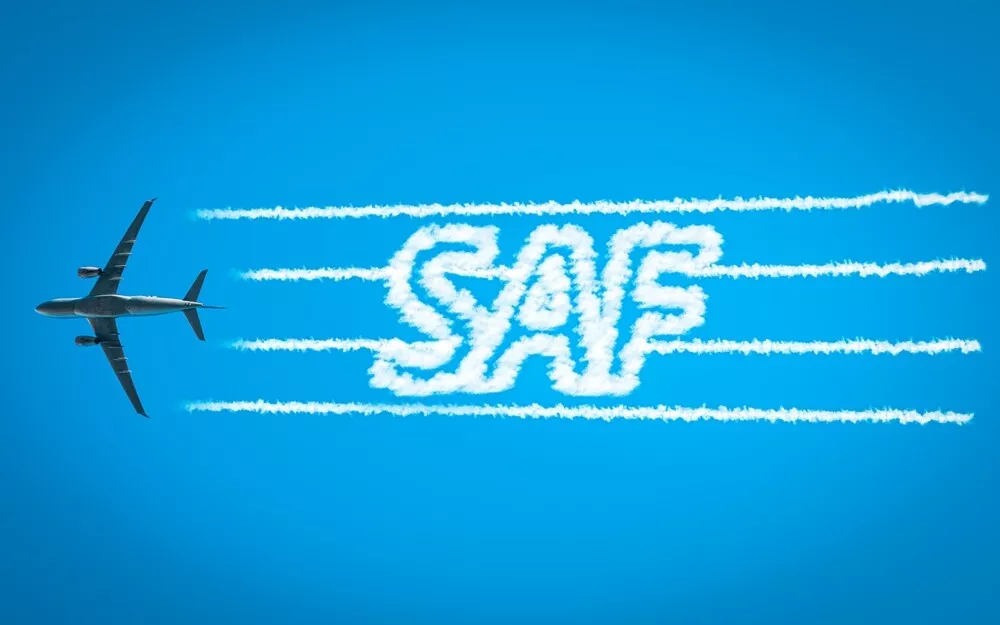Major airlines are collaborating with fuel companies to develop new technologies to produce Sustainable Aviation Fuel (SAF) as a way to significantly reduce greenhouse gas emissions.
For example, Neste, a world leader in renewable products, and Air BP, a major aviation fuel supplier, have recently formed a partnership to explore how to make SAF more readily available for airlines.
Fossil fuel-based jet fuel has long powered airplanes, but concerns about climate change are pushing the industry towards cleaner alternatives. SAF, derived from renewable sources like used cooking oil, plant waste, and agricultural residues, offers a promising solution.
the Sustainable Aviation Fuel (SAF) industry is buzzing with promise! Here’s a quick rundown on why it’s such a gamechanger:
- Decarbonization Hero: The aviation industry is a significant contributor to greenhouse gas emissions. SAF offers a major advantage – it can dramatically reduce lifecycle emissions compared to traditional jet fuel, some pathways even reaching net-negative! This is crucial for achieving net-zero goals. SAF and other green alternatives
- Taking Flight with Innovation: There are multiple ways to produce SAF, using things like recycled waste, biomass, and even capturing carbon dioxide from the air. This variety ensures a robust and scalable solution. Sustainable Aviation Fuels
- Industry on Board: Airlines, governments, and energy companies are all recognizing SAF’s potential. Collaborations are increasing, with investment and policy changes like blending mandates on the rise. This creates a supportive environment for growth. Innovation Takes Flight With Sustainable Aviation Fuels
Table of Contents
Honeywell UOP’s ecofining technology pioneers SAF production
Honeywell Universal Oil Products (UOP) company is at the forefront of developing and delivering technology to various industries including petroleum refining, gas processing, petrochemical production, and major manufacturing.
Their ecofining technology powered the production of the SAF used on the world’s first 100% SAF passenger flight on December 1, 2021, operated by United Airlines (NYSE: UAL).
The Ecofining process enables the delivery of commercial volumes of SAF, aiding the aviation industry in reducing its carbon footprint and emissions, and facilitating affordable decarbonization options.
This technology actively produces SAF compliant with renewable energy regulations and sourced from sustainable feedstocks, resulting in a 65-85% reduction in greenhouse gas emissions compared to petroleum-based jet fuel.

Why wasn’t SAF widely used before?
The answer lies in economics. Developing and producing SAF using new technologies is expensive. Traditional jet fuel remains significantly cheaper, making airlines hesitant to switch entirely to SAF.
As United Airlines CEO Scott Kirby told the Financial Times:
“There’s no sustainable aviation fuel that is cost competitive yet with traditional jet fuel.”
Despite these advancements, the aviation industry still faces significant hurdles. A primary challenge is the limited availability of SAF, which is currently only accessible at a few airports globally. This limitation hampers airlines’ capacity to embrace SAF on a broader scale.
Another issue is the phenomenon of “greenwashing,” wherein airlines may falsely portray themselves as environmentally friendly by using minimal SAF blends.
To address these concerns, stakeholders are actively discussing the implementation of mandatory minimum SAF content in blended fuels. This initiative aims to guarantee transparency for eco-conscious travelers.
Critical collaboration with industry leaders
Recognizing the need for a global solution, industry leaders like Lufthansa Group, the largest airline group in Europe, and Shell, a global energy giant, are joining forces in a landmark agreement to improve the global supply chain for SAF.
This collaboration holds immense importance because aviation spans the globe, requiring solutions that cater to international travel demands.
The agreement they reached in December 2021 doesn’t oblige them to take action, but it outlines their plans for producing and delivering significant amounts of SAF to airports worldwide. They aim to supply about 1.8 million metric tons of SAF over seven years, starting in 2024.
This partnership between a major airline and a leading fuel supplier has the potential to increase SAF availability and speed up its adoption across the aviation industry.

Promising future with SAF
Airlines and fuel companies are collaborating to develop next-generation SAF with the goal of decreasing the aviation industry’s carbon footprint. SAF, which originates from renewable sources, offers a cleaner alternative to conventional jet fuel.
Honeywell UOP’s Ecofining technology is at the forefront, empowering the production of commercial volumes of SAF that agree to stringent safety standards. Nevertheless, challenges persist in terms of cost and limited availability.

Looking forward, promising new technologies and industry collaborations, such as Lufthansa and Shell’s global SAF supply chain initiative, are actively forging the path towards a greener future.
Increased demand from both commercial and military sectors is expected to propel the SAF market. Continued innovation could revolutionize air travel with SAF, ensuring cleaner skies.
Sustainable Aviation Fuel: The Future of Flight
A Greener Sky
The aviation industry is undergoing a transformative shift, with Sustainable Aviation Fuel (SAF) emerging as a frontrunner in the quest for a greener sky. Derived from renewable sources such as used cooking oil, agricultural waste, and even captured carbon, SAF offers a compelling alternative to traditional jet fuel.
How SAF Works
Unlike fossil fuels, SAF significantly reduces greenhouse gas emissions without compromising performance. It is seamlessly compatible with existing aircraft engines and infrastructure, making the transition smooth for airlines.
A Promising Future
The potential of SAF to revolutionize the aviation industry is immense. Major airlines are setting ambitious targets for SAF usage, and governments are implementing supportive policies to accelerate its adoption. While challenges such as scaling production and cost remain, the industry is making steady progress.
As technology advances and demand grows, SAF is poised to become a cornerstone of a sustainable aviation future.
Sustainable Aviation Fuel: Powering a Greener Future
A Drop-in Solution
Sustainable Aviation Fuel (SAF) is a game-changer for the aviation industry. It’s a drop-in fuel, meaning it can be blended with traditional jet fuel without requiring any modifications to aircraft or infrastructure. This seamless integration makes SAF a practical and immediate solution to reduce aviation’s carbon footprint.
A Diverse Fuel Source
The beauty of SAF lies in its versatility. It can be produced from a wide range of sustainable feedstocks, including:
- Waste oils and fats: Transforming used cooking oil and animal fats into fuel.
- Agricultural residues: Utilizing crop waste and byproducts.
- Forestry residues: Converting wood waste into energy.
- Municipal solid waste: Recycling urban waste into a valuable resource.
By harnessing these diverse feedstocks, SAF helps to reduce waste and create a circular economy.
Overcoming Challenges
While the potential of SAF is immense, challenges remain. Scaling up production to meet the growing demand for aviation fuel is a key hurdle. Additionally, the cost of SAF is currently higher than traditional jet fuel.
Government policies, investments in research and development, and collaboration between industry stakeholders are crucial to addressing these challenges and accelerating the adoption of SAF.
A Brighter Horizon
The aviation industry is at a crossroads. SAF offers a clear path towards a more sustainable future. By investing in research, developing robust supply chains, and implementing supportive policies, we can unlock the full potential of SAF and create a cleaner, greener aviation sector.
Disclaimer ||
The Information provided on this website article does not constitute investment advice ,financial advice,trading advice,or any other sort of advice and you should not treat any of the website’s content as such.
Always do your own research! DYOR NFA
Coin Data Cap does not recommend that any cryptocurrency should be bought, sold or held by you, Do Conduct your own due diligence and consult your financial adviser before making any investment decisions!





Leave feedback about this